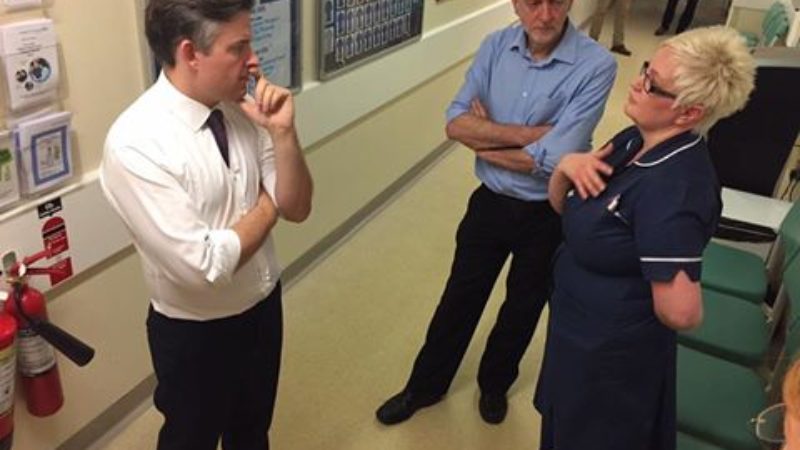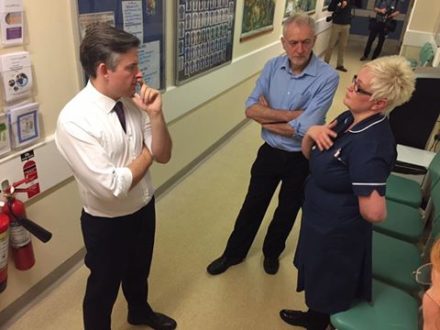

While the snow delights children and Instagram users, it is confirmation for our NHS staff that winter is most definitely here. Already hospitals have had to divert patients away because of over-capacity and 20,000 patients were stuck in the back of an ambulance for over 30 minutes in a period of just two weeks.
The state of the NHS under the Tories gets worse each day with ever-lengthening queues of the sick as waiting lists climb beyond four million. Last year 2.5 million people waited more than four hours in A&E, while over 560,000 people were designated as “trolley waits” because of acute bed shortages.
Austerity for the NHS has meant the biggest financial squeeze in its history, public health budgets cut and social care slashed severely by billions.
Some 14,000 beds have disappeared from the NHS and hospitals are now often occupied at unsafe levels. Over 400,000 elderly and vulnerable people are without the social care support they otherwise would have received. Community walk-in-centres have closed and local pharmacies seen their budgets cut all putting more pressure on A&E departments.
There are vacancies for more than 35,000 nurses, despite promises to recruit more GPs, we have 1,000 less than a year ago and we have seen district nurses and health visitors lost from the front line. The abandonment of the 18 week target for “non urgent” operations will mean more and more of our constituents waiting longer in treatment in pain and distress.
The news earlier this year that increasing numbers are now paying for operations such as hip replacements or knee replacements, because of escalating waiting times, should send alarm bells ringing for campaigners who share my belief that we must restore a fully-funded, comprehensive, universal, publicly-provided and owned national health service.
Meanwhile, advertisements have emerged across the London Underground for private healthcare – “topdoctors” – telling London commuters that when you need a doctor you need the “best one” implying the best aren’t in our NHS. I’m not sure they could be more offensive and crass if they tried.
This are all the very real implications of Tory underfunding and we’ll make no apology for continuing to highlight the impact on patients. Indeed we’ll redouble our campaigning efforts to demand our health service is given the investment it needs as we head into the 70th anniversary of the NHS.
And as we celebrate 70th years of the NHS we’ll continue to campaign to end the toxic privatisation agenda that destroys the very soul of the NHS too.
In our recent manifesto we pledged to repeal the health and social care act, and to reinstate the powers of the secretary of state for health to have overall responsibility for the NHS. We are determined to reverse the Tory privatisation of our NHS.
That’s why earlier this year I raised warnings about a possible fire sale of NHS assets after my research showed that ministers had doubled the amount of land – now up to 1,332 hectares including many used for medical purposes – they’re looking to sell off.
And at our party conference John McDonnell confirmed his intention to deal with the PFI deals that see taxpayers’ money drain out to private companies.
But perhaps the urgency of our commitment to end privatisation was laid bare last week with the shocking revelation that Virgin Care had successfully sued our NHS, some say for possibly up to £2m, after losing out on an £82m contract to provide children’s health services across Surrey.
This action has drawn widespread condemnation with thousands signing a petition demanding Virgin “give the money back”. A tweet from Richard Branson asking whether it’s possible to fall in love with a brand seems particularly ill judged in this context.
Meanwhile Babylon have been given a contract for an online GP service effectively cherry picking the patients easiest to treat.
Under the Tories more of the NHS budget has gone to private health firms, many of whom have become increasingly aggressive in pursuit of contracts. Department of Health figures show that the percentage of its funding allocated to the private sector is about 7.6 per cent, the equivalent of £8.7bn of the total NHS budget.
In fact the real figure is most likely far higher: much private work is masked from official records by complex operating arrangements with large private-sector health corporations whose sole concern is creaming off profits from public money.
NHS staff will be the first to tell you just how harmful this needless privatisation has been. A survey earlier this year of BMA doctors found that more than two thirds were fairly or very uncomfortable with independent sector provision of NHS services. Many were rightly concerned that the primary motivation for many independent sector providers is profit, rather than providing the highest possible standard of care for patients.
The source for this privatisation agenda is the Tory health and social care act. Despite vociferous opposition from Labour, patients and the public, Part 3 of the 2012 Act extended market-based approaches to health care, resulting in far greater private sector involvement as competition became the preferred means of improving health care.
Prior to the act, hospitals were only allowed to make 2 per cent of their income from private sources, but with the legislation’s passing the cap was egregiously lifted to 49 per cent.
Unsurprisingly, the Tories’ expansion of the internal market has led to one third of contracts being awarded to private providers since the act came into force in April 2013.
Some of these private contracts are vast and their failures have wasted millions of pounds worth of public money. A contract in Staffordshire to deliver end-of-life and cancer care worth £1.2bn was dropped in April- the procurement for the cancer element alone cost the four Staffordshire CCGs more than £840,000.
UnitingCare Partnership in Cambridgeshire and Peterborough is another controversial example of a procurement collapsing. Over £1m of public sector cash was wasted after an £800m, five-year contract to provide older peoples care collapsed just eight months after going live.
Similarly, in January 2015 the private sector operator, Circle, pulled out of a 10 year contract to run Hinchingbrooke Health Care Trust, a privately managed NHS district general hospital. This left the NHS with the subsequent operational risk when the franchise failed: Circle were only liable to cover financial deficits of up to £7m over the ten years, which was far below the total deficit incurred during the three years the private firm were in charge.
Private meddling is equally damaging on the commissioning side. Just a few months ago Burton Hospitals Foundation Trust was forced to pay £300,000 in VAT charges due to a controversial “prime provider” contract involving Virgin Care. These charges would not have been incurred had services been commissioned directly by the CCG rather than Virgin Care, which is outside the group of NHS organisations that can recover VAT costs.
In many instances, because of underfunding local health bosses feel compelled to turn to the private sector. The resultant lack of capacity means mental health and community services in particular have often had to rely on the private sector for short-term fixes.
Similarly, in the acute sector, drastic bed shortages have forced NHS hospitals to turn to the private sector to carry out non-emergency services. NHS Improvement reports that expenditure on outsourcing elective treatments to the private sector rose significantly from £241m in 2015/16 to £381m in 2016/17. For example, earlier this year we learnt that more than one-third of hip and knee operations are being carried out by companies such as Spire Healthcare, BMI and Nuffield.
Desperate NHS Trusts have also been forced to increase their expenditure on private ambulances by a fifth in just two years, despite serious patient safety ramifications. Indeed, the Care Quality Commission has highlighted that some private firms use less qualified staff who are forced to work in poorly equipped ambulances, with insufficient infection prevention and inadequate clinical governance.
For example, one patient transport contract was handed to a private company who sub-contracted to 20 other companies. When some of these companies ceased trading they couldn’t pay their ambulance drivers for eight weeks. Patients were routinely left stranded for hours often missing important appointments. Eventually this shambolic privatisation was ended and brought back in house.
The unprecedented financial squeeze on the NHS, coupled with the private sectors’ ability to undercut NHS providers, means CCGs will increasingly be under pressure to outsource more contracts, despite concerns about the quality of service that may ensue. This is another reason why campaigners must join us in demanding the underfunding of the NHS comes to an end.
Moreover, there have been shocking increases in hospital car parking charges, much of which has been contracted out to the private sector. Whilst thousands of disabled drivers and low-paid staff lost their free hospital parking last year, one of Britain’s biggest parking firms celebrated a 38 per cent jump in profits. It’s why Jeremy Corbyn committed Labour to abolishing car parking charges across the NHS.
The sad truth is that privatisation schemes like these are increasingly, and disproportionately, affecting the most vulnerable people using our health service.
But we can fight back.
Just a few months ago my shadow ministerial colleague Justin Madders secured a major victory by forcing the government to back down on their outrageous plan to privatise NHS Professionals. This effective and successful public body saves the taxpayer around £70m a year, by ensuring hospitals don’t have to rely on expensive private staffing agencies.
New privatisation fronts could well emerge too. There are fears that not only will Accountable Care Organisations (ACO) be a means to control local health spending through greater rationing and service cuts but that also they will be used as backdoor to private sector involvement in commissioning and providing local services too.
It’s why last week I tabled EDM 660 demanding a Commons vote and full parliamentary scrutiny on Tory plans to push through the creation of these Accountable Care Organisations.
And as the government attempts to negotiate new international trade deals we will be watching carefully, ready to call out any attempt to include the NHS in free trade agreements.
Next year is the 70th anniversary of the national health service, our party’s greatest achievement built by Nye Bevan and opposed tooth and nail by Tory parliamentarians who voted against its creation over 20 times.
Our commitment 70 years later is a fully funded NHS, reinstated and reintegrated NHS. An NHS restored as a public service, publicly provided with its democratic accountability strengthened.
I’m calling on Labour members, trade unions, NHS campaigners, and patients to join me as we campaign for the future of our NHS. Just as Labour created the NHS and rebuilt it in government, we will again fight to save our NHS today keeping it universal in scope and there for everyone when you need it.
Jon Ashworth is shadow health secretary.




More from LabourList
Antonia Romeo appointed to lead civil service as new Cabinet Secretary
‘If Labour is serious about upskilling Britain, it must mobilise local businesses’
Stella Tsantekidou column: ‘What are we to make of the Labour Together scandal?’